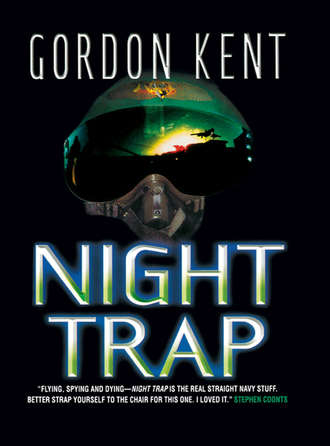
Полная версия
Night Trap
“Go on, go on.” He blew his nose.
“He has a second flat near the Gorki statue, under the name Platonov. Internal Security had it wired; I suspect he knew all that. Not a beginner, after all. He had a woman there sometimes, always the same. A little delicate.”
The Director looked at her over another white tissue.
“The daughter of Malenkov the gangster. We assume the other listening devices were his.”
He blew his nose. “Continue.”
“I interviewed her myself. She is terrified of her father. She is married to one of his boys; one or the other will kill her if they find out about Efremov, she says. As if Papa didn’t already know. She hasn’t seen him in—” she checked her notes “—ten days. She was to meet him at the flat three days ago but he didn’t appear. That checks out with Internal’s records—she was there for an hour alone, then left. Anyway, she doesn’t know where he is, she says, has no plans to meet him in some other place, and so on and so on.”
“You believe her?”
“Oh, yes. She’s a scared little thing. I threatened her a bit, she almost fainted. She needs to be questioned by somebody with more time than I have, really go over everything, her memory might turn up a clue. But we’d have to promise her something good—protection from her husband, maybe. Maybe her father, as well.”
He waved a tissue.
She looked up at him. He stopped sniffling and stared back. “I’ve had a look at his computer files. Surprisingly—mm—bland. I make no judgments, as you know, but—if I were the famous Sherlock Holmes, I would say they are significant for the fact that they are so insignificant.”
“Well, after all, his agents are run by underlings. He has how many agents?”
“He claims eighty.”
The Director looked up. “‘Claims’?”
Ouspenskaya, with a tiny shrug, said, “We pay for eighty; I am not entirely convinced that I see the files for eighty.”
The Director nodded, gloomy, as if his worst fears about her cynicism were confirmed.
“No evidence in his shredder or the burn box. By that, I mean only that there is no indication that this was a man preparing to leave. Everything points rather to a man who, mm, is not with us against his will.”
She looked, waited. The Director opened a drawer and took out a nasal spray, stuck it up one nostril and shut the other with a finger. “Continue,” he said. He sprayed.
“His computer may have been purged of some files. It’s hard to say, impossible for me, in fact; I’m not an expert. That computer, as I’ve told you a thousand times, is an antique and not to be trusted. American secretaries have better computers on their desks than you and I have in our—” He was waving his free hand at her, meaning Shut up, shut up, I’ve heard it over and over. “Well. The sum and substance is that Efremov has disappeared and I’ve found no evidence of anything. He’s gone. Kaput. Disappeared. What is it the British say? ‘Done a bunk’?”
“‘Taken a powder,’ the Americans say. A colloquialism I don’t understand at all.”
“Face powder? Or, sleeping draughts used to be called powders. Quite nonsensical.”
The Director threw himself back so hard that his chair springs made a catlike noise; he sniffed, then worked his nose up and down. “Efremov,” he said. “I like him. I trust him. Don’t you trust him?”
“He is devoted to his work.” She knew that she would gain no advantage with this man by claiming to have suspicions. In fact, she was afraid of Efremov and stayed away from him.
“All right. What are your suspicions?”
“Director! You hurt my feelings. Why must I have suspicions?”
He cleared his throat, like a man preparing to spit. “Between ourselves,” he said, “I admire your suspicious nature. Tell me what you think. I won’t necessarily believe you.”
She stared at the distant window. “I surprise myself by having no suspicions. Odd. I think I don’t know enough yet. But that makes me suspicious, because I have been looking into the man’s life for two days and it is all—bland. Like the creation of a perfect bureaucrat. And why not? Colonel Efremov has a splendid record, some might say brilliant; he has no ‘past,’ no quirks, no secret life except the girlfriend. Still—” Her voice trailed off. “He has decentralized his work over the past four years. One might say it is an example of perestroika. Or one might say it is the opposite—obfuscation. He has divided his agents into somewhat irregular groups for purposes of administration and created his own sub-sections to handle them. Nothing wrong, exactly, but—he has followed the CIA model of creating false entities, companies on the new free-market model, and using them to mask his organizations. Nothing wrong, but they are a little difficult to track.”
“Accountability?” the Director said hoarsely.
“Financing, to be sure.”
“False agents?” The Director sounded heart-broken.
“I have no evidence of such a thing. But—!” She stood up. “Suppose the girl’s gangster father learned something, maybe from her, maybe with his taps, maybe somewhere else—let’s say that he learned that his daughter’s KGB colonel—sorry, SVRR colonel—was making money from his elaborate administrative structure. Let us just say he learned that we are paying for agents who don’t exist. He confronts Efremov. He says, ‘Do such-and-such for me, or I tell your bosses.’”
“‘Such-and-such’?”
“Oh—information about KGB—SVRR—penetration of foreign businesses, or a lever on contracts, or—my God, you know how illegal money is made as well as I!”
The Director blew his nose. “Proceed.”
“And Efremov says no, or he tries to exercise some power of his own, and Papa has him killed. Or, another scenario, Efremov kills himself!”
“Rather Lermontov, that.”
“I agree. Or he leaves the country.”
The Director rubbed his already red eyes. “Or he could be lying in a stalled car in the snow beside a back road he took by mistake on the way to his dacha.” He looked at her between his fingers. “We mustn’t overlook the accidental.” He studied her face. “There’s something more. Come on.”
She shook her head vigorously; her brown hair bounced back and forth. “Only an anomaly. Nine months ago, he set up another of his entities to support four agents. For him, perfectly normal procedure—except that all his other entities support twelve to fifteen agents.”
“That doesn’t seem much to me.”
“His best four agents. You know how he liked to brag—keeping a secret and bragging at the same time. Like those note cards he always had in his pocket, writing down the most important things he was doing that day: something a rank beginner would know better than to do. He would brag of something that one of his agents had brought him, then cover his tracks by hiding the nationality or some such. In fact he was deliberately transparent about some things—their jobs, for example. I knew that he’d an agent who was on the maintenance staff at NATO in Brussels, for example. Also somebody in the American military. Those and two others had been set up in this new entity.”
“The others?”
She shook her head. “One I think was a woman. That’s all I can tell at this point in time. If you’d allow me some expert support to go into his computer—”
He shook his head. “Keep it in the house.” He spat into his tissue and looked at the result. “Maybe he’ll turn up. Maybe he’s just sulking someplace. Maybe he’s dead.” The contents of the tissue made him even gloomier. “Maybe it’s we who are dead, hmm? Moscow, the city of the dead? I would have been reprimanded for treason for saying that once. Now, I wish there was somebody to reprimand me.”
1038 Zulu. Mid-Atlantic.
He reported to a lieutenant commander in the inboard intel center. Peretz was a slouching, slightly bald man his father’s age who had sick-looking circles under his eyes and a constant air of gloom.
“You Mick Craik’s son?”
“Yes, sir.”
“Siddown, siddown. Your father and I go way back. In fact, the first squadron I served with.” Peretz wore glasses and used them like an academic, looking over the tops or pointing them for emphasis. Now, he pulled them down his nose and stared at Alan. “I understand you fly.”
“Yes, sir.”
“Gonna stay with it?”
“I want to.”
Peretz made a face, half-grotesque; his gloom was a mask for a sardonic sense of humor, Alan realized. He pushed his glasses up. “What do the flyboys call you?”
“Spy.”
“Could be worse. ‘Dickhead’ is a favorite. You get along?”
“I think so.”
Peretz nodded, a rapid head movement that made his shoulders bob. Looking at his hands, he said, “You know the other battle group found us last night.”
“Oh, shit.”
Peretz looked up at him. His eyes were shrewd and perhaps amused. “Did you do a wide radar sweep just before you made the stack last night?”
Alan flushed. “We weren’t in EMCON.”
“JFK thought somebody found them last night. They were sure we’d be on them.” He looked up from his fingers. “No report was made.”
“No, sir.”
“You didn’t know you’d flashed them?”
Alan hesitated. Should he protect Rafe? He thought that Peretz was trying to teach him something, that this was between two intel officers, the flyers not part of it. He took a chance. “I caught two bananas south of Pico and ID’d one as the Kennedy. Was I right?”
Peretz nodded. He seemed fascinated by his own fingertips, even sniffed them from time to time. “How come you didn’t give us a blast?”
“Are we in trouble over this?”
“We? You mean, you and your pilot? Naw. This is between Kennedy’s 10 and me and the gatepost.”
“I thought the admiral would be pissed.”
“He is. But you’re too young to feed to an admiral. He wouldn’t get any satisfaction from reaming you out; admirals want commanders or higher.” Peretz grinned at his hands. “A Brit wrote after World War II that flag officers are best thought of as old ladies who need very careful handling.” He raised his eyebrows and glanced at Alan. “Keep it in mind.”
“I didn’t report it because my mission commander—let’s say he ruled the mission was over.”
Peretz swung forward, hands on knees. “Okay. Learning time. You had important information and you didn’t do with it what you’re supposed to. It’s no good saying to yourself it’s his call and he’ll take the heat. You going to do this in a combat situation? You’re an intelligence officer—you have a responsibility. I don’t care how much you like to fly! Information, information! You let us down. You let yourself down.” He leaned back. “And I’d have done the same thing.” He smiled. “You must be pretty good with that TACCO rig, to pick them up like that.”
“It was iffy.”
Peretz nodded. “As a TACCO, next time let the intelligence officer in you decide whether the iffy stuff is worth following up. Okay? End of lecture.” He waved a hand. “Nobody gets in trouble over this one.” He did the same rapid head-nod. “You want to belong. Am I right? You want to be one of the boys. Aviators are a funny lot.” He chuckled. “I coach my daughter’s soccer team. All girls. They taught me a lot about aviators. I began to see aviators completely differently once I learned to look at them as a girls’ soccer team.”
Alan thought he was supposed to laugh, did, felt like a traitor to his mates, and said, “Girls?”
“Yeah. Think about it. Lots of nervous laughter. Very cliquey. Full of insecurity. Always clustering around the most popular girl—that is, the guy with the most clout with the skipper, or the best landing grades. Love gossip. Get in corners and giggle together. Share secrets a lot—snicker, snicker. Try it. It might make you worry less about being an 10.”
He was, Alan thought, a disappointed man who had found a little fantasy to cover his own failure. Granted, being a Jewish 10 would be even harder than being Alan Craik; and he guessed that Peretz came across to flyers as a weird nerd, to boot. Still, the idea of his squadron as a cabal of prepubescent girls had its appeal. He changed the subject by saying, “How do I get back to my ship?”
“You don’t. Not till we hit the first liberty port. They’re cutting orders for you to stay here with me until then.” He saw Alan’s stricken face. “This is important! You’re going to do a lieutenant’s job—learn the joint-ops template and brief it on your boat. You brief the squadron commanders, air wing, ship’s captain, the works. I would have had to pull somebody over here from your boat, otherwise.”
Alan thought of the flying hours missed. That, he realized, was precisely what Peretz had so gently read him out for—thinking more of the flying than his real job.
“Sounds good.” Did he mean that?
He found his father in his squadron’s ready room. His father grabbed him, held on to his arm to keep him from escaping while he explained something to two other officers. They moved into the passage, and then his father continued to carry on brief exchanges with passing men while he talked to Alan. His father seemed to know everybody, so that every few words he was interrupting himself with, “Hey, Jack,” “George, how’re they hanging this morning?” “Smoker, good to see you—” His eyes flicked constantly away from Alan, up and down the passage, as if he were a politician looking for constituents. Perhaps he was; being a squadron commander has its political side.
“So,” he said, “you get some sleep? Hiya, Gomer.”
“I was wiped.”
“Bill. I hear you’re going to be here a few days. Kincaid, I want a report on Florio’s mother—if it’s cancer, give him compassionate. Yeah, today. You meet B ernie Peretz?”
“Yeah, I—”
“Hey, Deek, stand by, man, I need to talk to you. What’ja think?”
“I liked him.”
“You did. Hey, Mac. Yeah, Bernie’s an okay guy. Uh—he’s getting out, you know.” His father said that in a faint tone of warning, meaning—what? That he shouldn’t take Peretz too seriously? Shouldn’t use him as a model?
“Why’s he getting out?”
“Passed over for commander. Phil, you guys stank yesterday. This isn’t the Mongolian Navy we ‘re running here. We care, get me? He didn’t make the cut. Bernie’s okay, but—he likes to stay home with the kids and the dog. He’s good at what he does, though—learn what you can from him. Word to the wise: do good on this one, it’s all money in the bank. You do these briefings, your name gets around—it’s all part of the profession.”
“You always used to tell me that doing my best was all that mattered.”
Why had he said that? Already, he had put that prickly hedge between them. Let him say whatever he wants, an inner voice cautioned. But too late.
“Doing your best and having other people know it. You gotta be practical, kiddo. Something you’re not very good at—they don’t teach it in the ivory tower, right?”
Don’t rise to it, the inner voice said. This is as hard for him as for you. It was the old opposition. Style. Culture.
His father said, “Anyway, we’ll have a look at Naples together, okay?”
“Palma.”
“Your boat’s going to Palma; we’re making liberty at Naples. You’re on this boat, kid.”
“Oh, God! Dad, Kim’s meeting me at Palma!”
“Kim? The redhead with the big gazumbahs I met at Shakey’s with you?”
And he lost it. “Goddamit, Dad—!”
“Oh, sorry—I meant to say, ‘the young lady with the enormous intellect.’ Snake—Jackson, hey—”
He yanked his arm away. “Dad, Kim and I are practically engaged!”
His father gave him a strange look. His eyes stopped flicking up and down the passage. He took plenty of time, perhaps thinking of something and then deciding to say something else. “Like father, like son, huh?”
“You said it; I didn’t.” His father’s record with women was abysmal: he had been married twice, both failures, the first to Alan’s mother, the second to a fleshy woman named Thelma who had had huge breasts and the brain of an ant, although she had been smart enough to get out after eight months. Alan almost said, When I get married, I mean to stay that way, but he bit the words off. Instead, forcing himself to be calmer, he said, “You’re talking about somebody you don’t know anything about,” and his cheeks flamed.
His father made a face. “Sorry, she looked like Son of Thelma to me. Give me her address, I’ll get a message to her you’ll be in Naples.” Again, he looked at Alan strangely. “I think there’s a lot I don’t know about you all of a sudden.”
1311 Zulu. Langley, Virginia.
George Shreed heaved himself off his metal canes and into his chair, propping the canes against the desk, supported on a decorative turning that was faintly worn from years of such use. His shock of gray hair stood up on his head, rather startling, almost as if he had had it styled that way, looking not unlike the Nobel winner Samuel Beckett. He lit a cigarette and turned to the morning book—pages of already digested and analyzed intelligence, winnowed, prioritized, emphasized, and most of it crap, he thought. He flipped pages. One item caught his eye; unthinkingly, he put a little tick next to it. Moscow. Massacre in office building. At least thirty dead in military-style attack. Probable organized cime but target not clear. Spetsnaz-style execution of aged security guard. Unconfirmed dummy company. He looked back a page, then ahead, jumped to the Russian and area forecast section and again did not find what he wanted. “Sally!” he said harshly, pressing down a button. “We had a Not Seen on Yuri Efremov a couple days ago, Moscow. Get some details.” He returned to his briefing book.
1323 Zulu. Moscow.
The stink of fire and chemicals lay in the damp air even after the fire was out. A police detective, hands plunged into the pockets of his cheap ski jacket, stared gloomily at the building’s doorway as another body bag came down.
“Thirty-one,” the cop next to him said.
“How do you know it’s thirty-one? You’ve put the pieces together, have you?”
“Thirty-one bags.”
“Imbecile.” He crossed the wet street and pushed through the firemen. As an investigation, this was going to be a joke. What the firemen hadn’t bitched up, the bomb squad had. They’d be a week just working out how many dead they had.
“Hey, sir, that’s where they found the old man.” A plainclothes cop he knew pointed toward the floor near the far wall. “Back of the head, close range—typical stuff.”
Typical, my ass, he thought, it didn’t get to be typical until fucking Gorbachev showed up with his freedom and his shit. Aloud, he said, “Ex-mil.”
“Yes, sir.”
The detective trusted the man, knew him to be more or less honest, perceptive when he wasn’t too lazy to think. “So?” he said, bobbing his head toward the upstairs. Water, he saw, had spilled down the stairs and was leaking through the ceiling. Broken pipes.
“I seen it ten times in the last few years. You know. Ex-mil for hire, they’re fucking good at it, fucking Rambos. It’s mafia.” He had been talking to people in the building and could give a quick summary of what was up there—the big room with thin partitions, computers, lots of telephones, some kind of high-tech business. “So they wouldn’t pay off the gangsters, they got hit,” he said with a shrug.
“Computers? Western money?”
“I dunno. This is just what the people in the building say.”
It didn’t click for him. He was slower to reach conclusions but reached sounder ones when he did; maybe that’s why he was a detective. “Let’s have a look,” he said.
“Fucking mess up there.”
“No kidding.” He started up the stairs, keeping near the wall where there was less water.
1441 Zulu. Mid-Atlantic.
Peretz had nothing for him yet, and he wandered down to the JO wardroom for lack of anything to do. Carriers are carriers, your own or somebody else’s: a lot of hours to kill. He wished he had work, or—He thought of Kim.
Narc was sitting alone at a table. Heading for him, Alan remembered Peretz’s fantasy about the girls’ team; he tried it here. Five pilots were laughing too loud a few feet away; another pair were muttering together with their heads close. Raise the pitch of the laughter, blur your eyes and give them longer hair—my god, it might work! He thought of Peretz’s edged description: insecurity, cliquishness, rivalry …
“Hey, Narc.”
“You know we’re gonna be on this boat for five fucking days?”
“I’m fine, thanks; how nice of you to ask. And how are you this morning?”
“I’m pissed off. I don’t have a dad to entertain me while I’m aboard, okay?”
“Okay, okay—sorry. Hey, I haven’t seen Rafe.”
Narc snorted. “Our pilot and senior chief have already left. Nice, huh? Skipper pulled them back the first chopper they could get. Isn’t that swell! They go, I stay.”
Alan, despite himself, tuned out the content, listened only to the tone; was this Peretz’s jealousy, preadolescent gossip? He was wondering if Narc could make it as an eleven-year-old girl when Narc leaned forward and said, “I think I’m a better pilot than Rafe—don’t you?”
“Rafe’s pretty good,” Alan muttered. He was trying to keep from chuckling, and Peretz’s imagery came to him. He let Narc jabber on; inside his own head he was crushing the image of the young girls. Such a petty revenge might be fine for a man who was leaving the Navy; it could only get Alan into trouble. He put the notion aside, thought instead of his father’s comments about his girl.
“Absolutely,” he said. That was all Narc demanded of him—sympathetic sounds.
“Right.”
His father had no right to speak to him like that, he thought, then saw that of course he had; what was galling was that it was such a cheap shot, especially from him. Alan had once heard his father referred to as “Mattress Mick,” knew he was a womanizer.
“You bet,” he said to Narc’s vaguely heard complaints.
He felt Narc actually liking him, warming to his support. “I mean,” Narc was saying, “I don’t take anything away from the guy; he put Christine into the net and didn’t total her. Good job. I give the fucker his due. But goddam it, it all started with him trying to land on the wrong boat. Jesus H. Christ! Is that first-class flying? Is it?”
“Well—”
“Right! And what’s his punishment? Do you know what his punishment is? Huh?”
“What?”
“He’s gotta buy a beer for everybody who repaints Christine. Huh? Get it?”
Alan didn’t get it. He supposed somebody would paint out the damage to Christine’s facelift—so what?
“Look, Spy, this is how it goes. When you put a plane on the wrong carrier and it needs work, they repaint it, see, with their logo and their markings. In effect, it’s a plane from this carrier’s S-3 squadron now. Get it? So then it gets sent home to our carrier and it has to be repainted again with our logo and our marks. See? Well, every officer and EM in the squadron will want a hand on a spraygun to say he helped, see, so Rafe has to buy beer for the squadron. Well, what the hell is that? A guy puts a plane down on the wrong boat and we wind up with a fucking beer party. Is that right?”
Narc was outraged. He was not the brightest guy ever to join the Navy, but he was not far from wrong in believing he had been born to fly. He wanted to be an astronaut. He took it all very seriously.
“Maybe we could reintroduce flogging,” Alan made the mistake of saying.
Narc stared at him, finally got it, said, “Your human interaction is piss-poor, did anybody ever tell you that? I’m saying this for your own good. You don’t get along.”








